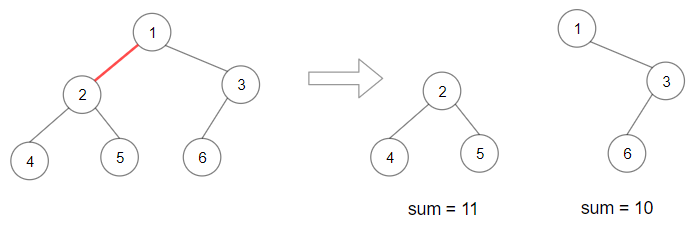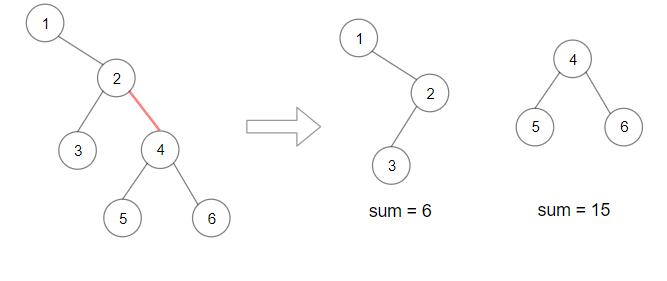二叉树
树
深度优先搜索
题目描述
给你一棵二叉树,它的根为 root 。请你删除 1 条边,使二叉树分裂成两棵子树,且它们子树和的乘积尽可能大。
由于答案可能会很大,请你将结果对 10^9 + 7 取模后再返回。
示例 1:
输入: root = [1,2,3,4,5,6]
输出: 110
解释: 删除红色的边,得到 2 棵子树,和分别为 11 和 10 。它们的乘积是 110 (11*10)
示例 2:
输入: root = [1,null,2,3,4,null,null,5,6]
输出: 90
解释: 移除红色的边,得到 2 棵子树,和分别是 15 和 6 。它们的乘积为 90 (15*6)
示例 3:
输入: root = [2,3,9,10,7,8,6,5,4,11,1]
输出: 1025
示例 4:
输入: root = [1,1]
输出: 1
提示:
每棵树最多有 50000 个节点,且至少有 2 个节点。
每个节点的值在 [1, 10000] 之间。
解法
方法一:两次 DFS
我们可以用两次 DFS 来解决这个问题。
第一次,我们用一个 \(sum(root)\) 函数递归求出整棵树所有节点的和,记为 \(s\) 。
第二次,我们用一个 \(dfs(root)\) 函数递归遍历每个节点,求出以当前节点为根的子树的节点和 \(t\) ,那么当前节点与其父节点分裂后两棵子树的节点和分别为 \(t\) 和 \(s - t\) ,它们的乘积为 \(t \times (s - t)\) ,我们遍历所有节点,求出乘积的最大值,即为答案。
时间复杂度 \(O(n)\) ,空间复杂度 \(O(n)\) 。其中 \(n\) 是二叉树的节点数。
Python3 Java C++ Go TypeScript
1
2
3
4
5
6
7
8
9
10
11
12
13
14
15
16
17
18
19
20
21
22
23
24
25
26
27 # Definition for a binary tree node.
# class TreeNode:
# def __init__(self, val=0, left=None, right=None):
# self.val = val
# self.left = left
# self.right = right
class Solution :
def maxProduct ( self , root : Optional [ TreeNode ]) -> int :
def sum ( root : Optional [ TreeNode ]) -> int :
if root is None :
return 0
return root . val + sum ( root . left ) + sum ( root . right )
def dfs ( root : Optional [ TreeNode ]) -> int :
if root is None :
return 0
t = root . val + dfs ( root . left ) + dfs ( root . right )
nonlocal ans , s
if t < s :
ans = max ( ans , t * ( s - t ))
return t
mod = 10 ** 9 + 7
s = sum ( root )
ans = 0
dfs ( root )
return ans % mod
1
2
3
4
5
6
7
8
9
10
11
12
13
14
15
16
17
18
19
20
21
22
23
24
25
26
27
28
29
30
31
32
33
34
35
36
37
38
39
40
41
42
43
44 /**
* Definition for a binary tree node.
* public class TreeNode {
* int val;
* TreeNode left;
* TreeNode right;
* TreeNode() {}
* TreeNode(int val) { this.val = val; }
* TreeNode(int val, TreeNode left, TreeNode right) {
* this.val = val;
* this.left = left;
* this.right = right;
* }
* }
*/
class Solution {
private long ans ;
private long s ;
public int maxProduct ( TreeNode root ) {
final int mod = ( int ) 1e9 + 7 ;
s = sum ( root );
dfs ( root );
return ( int ) ( ans % mod );
}
private long dfs ( TreeNode root ) {
if ( root == null ) {
return 0 ;
}
long t = root . val + dfs ( root . left ) + dfs ( root . right );
if ( t < s ) {
ans = Math . max ( ans , t * ( s - t ));
}
return t ;
}
private long sum ( TreeNode root ) {
if ( root == null ) {
return 0 ;
}
return root . val + sum ( root . left ) + sum ( root . right );
}
}
1
2
3
4
5
6
7
8
9
10
11
12
13
14
15
16
17
18
19
20
21
22
23
24
25
26
27
28
29
30
31
32
33
34
35
36
37
38
39
40
41
42 /**
* Definition for a binary tree node.
* struct TreeNode {
* int val;
* TreeNode *left;
* TreeNode *right;
* TreeNode() : val(0), left(nullptr), right(nullptr) {}
* TreeNode(int x) : val(x), left(nullptr), right(nullptr) {}
* TreeNode(int x, TreeNode *left, TreeNode *right) : val(x), left(left), right(right) {}
* };
*/
class Solution {
public :
int maxProduct ( TreeNode * root ) {
using ll = long long ;
ll ans = 0 ;
const int mod = 1e9 + 7 ;
function < ll ( TreeNode * ) > sum = [ & ]( TreeNode * root ) -> ll {
if ( ! root ) {
return 0 ;
}
return root -> val + sum ( root -> left ) + sum ( root -> right );
};
ll s = sum ( root );
function < ll ( TreeNode * ) > dfs = [ & ]( TreeNode * root ) -> ll {
if ( ! root ) {
return 0 ;
}
ll t = root -> val + dfs ( root -> left ) + dfs ( root -> right );
if ( t < s ) {
ans = max ( ans , t * ( s - t ));
}
return t ;
};
dfs ( root );
return ans % mod ;
}
};
1
2
3
4
5
6
7
8
9
10
11
12
13
14
15
16
17
18
19
20
21
22
23
24
25
26
27
28
29
30
31
32
33 /**
* Definition for a binary tree node.
* type TreeNode struct {
* Val int
* Left *TreeNode
* Right *TreeNode
* }
*/
func maxProduct ( root * TreeNode ) ( ans int ) {
const mod = 1e9 + 7
var sum func ( * TreeNode ) int
sum = func ( root * TreeNode ) int {
if root == nil {
return 0
}
return root . Val + sum ( root . Left ) + sum ( root . Right )
}
s := sum ( root )
var dfs func ( * TreeNode ) int
dfs = func ( root * TreeNode ) int {
if root == nil {
return 0
}
t := root . Val + dfs ( root . Left ) + dfs ( root . Right )
if t < s {
ans = max ( ans , t * ( s - t ))
}
return t
}
dfs ( root )
ans %= mod
return
}
1
2
3
4
5
6
7
8
9
10
11
12
13
14
15
16
17
18
19
20
21
22
23
24
25
26
27
28
29
30
31
32
33
34
35
36
37 /**
* Definition for a binary tree node.
* class TreeNode {
* val: number
* left: TreeNode | null
* right: TreeNode | null
* constructor(val?: number, left?: TreeNode | null, right?: TreeNode | null) {
* this.val = (val===undefined ? 0 : val)
* this.left = (left===undefined ? null : left)
* this.right = (right===undefined ? null : right)
* }
* }
*/
function maxProduct ( root : TreeNode | null ) : number {
const sum = ( root : TreeNode | null ) : number => {
if ( ! root ) {
return 0 ;
}
return root . val + sum ( root . left ) + sum ( root . right );
};
const s = sum ( root );
let ans = 0 ;
const mod = 1e9 + 7 ;
const dfs = ( root : TreeNode | null ) : number => {
if ( ! root ) {
return 0 ;
}
const t = root . val + dfs ( root . left ) + dfs ( root . right );
if ( t < s ) {
ans = Math . max ( ans , t * ( s - t ));
}
return t ;
};
dfs ( root );
return ans % mod ;
}
GitHub




